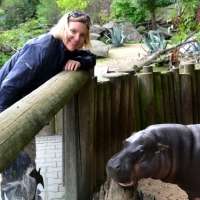A helping hand for pygmy hippos

Nobody knows how many pygmy hippos remain in wild habitats in West Africa, but there are only about 350 in captivity world-wide and a researcher at The University of Western Australia is in a race against time to ensure the species' survival.
Probably endangered in the wild - where their forests are under threat from mining, logging and agriculture - pygmy hippos are not prolific breeders in the 133 zoos and private collections around the world that house this species.
Gabriella Flacke, a veterinarian who is completing a PhD at UWA, is hoping her study of captive pygmy hippos in the United States - which has more than any other country - will mean that 22nd century humans will still be able to enjoy seeing them.
The last and only pygmy hippo in Perth zoo, Penny, died at the age of 43 in 1980. She originally came from Liberia. The only remaining pygmy hippos in Australia are at Melbourne Zoo (three) and Taronga Zoo, Sydney (two).
Dr Flacke said pygmy hippos are solitary forest animals slightly larger than a big pig. At around 200 - 250 kg, they are much smaller than common hippos, which weigh around 2000kg.
Before starting her study of the 70 pygmy hippos in the US, Dr Flacke spent five weeks studying their wild counterparts on the Ivory Coast. However, a series of logistical problems prevented the project from progressing and she had to return home.
In her work with captive pygmy hippos she is examining their health, potential stressors associated with captivity, and ways to monitor and improve their reproduction.
With access to pygmy hippo medical records from zoos across the globe, going back 100 years in some cases, she can determine what caused illness and eventual death, and using studbooks, can make recommendations based on genetic lineages on how zoos can best ensure healthy pygmy hippos in the future.
Her initial research has found more than 40 per cent of captive pygmy hippos world-wide to be affected by polycystic kidney disease. Furthermore, many pairs do not reproduce successfully. By developing tests to analyse the reproductive hormones in their dung, she is hoping to be able to advise zoos on how to improve their reproduction and identify reproductive health problems.
Provided by University of Western Australia



















